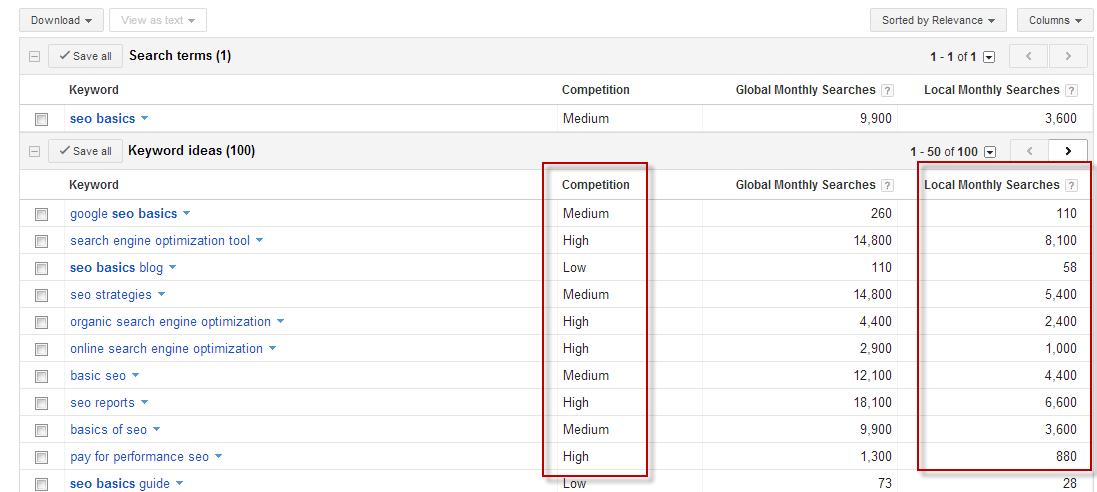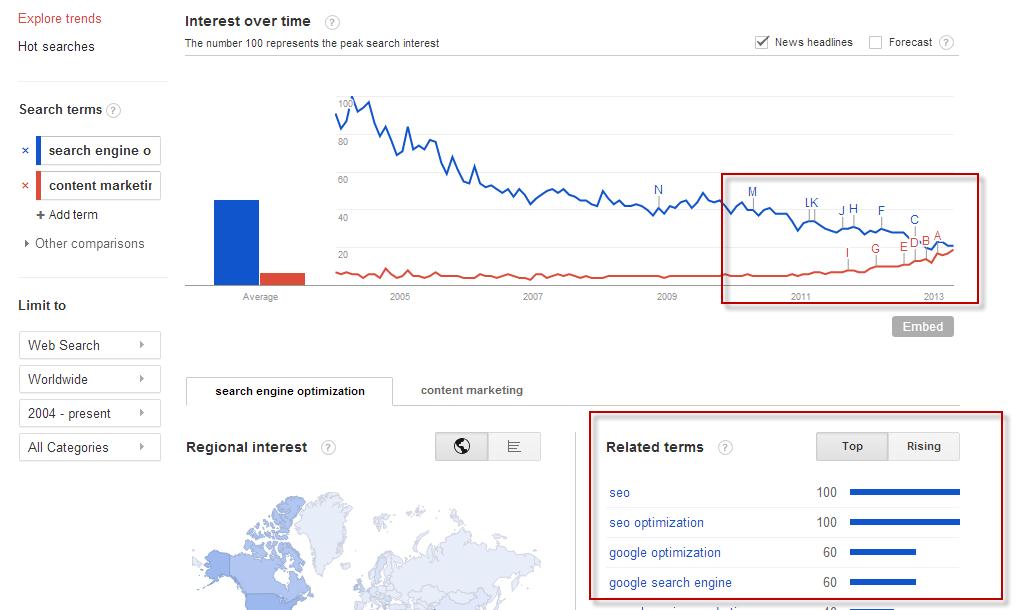 Guest post by Sean McGinnis
Guest post by Sean McGinnis
I’ve been a web marketer for a long, long time. Having built my first web site (DVD Verdict) in April 1999 and managed one of the larger SEO teams in the country from 2006 to 2009, it’s safe to say I’ve seen many changes in web marketing over time.
Interestingly enough, there is one thing that has never changed – not one lick over the previous 14 years – and that is keyword research.
Finding keywords is one of the most important (and most overlooked) aspects of web marketing. I’m not going to try to convince you why doing keyword research is important. That’s a blog post for another day.
Today, I want to help you find the right keywords. Let’s dig right in.
Image: esocialmediashop via Flickr, CC 2.0
Finding keywords
There are many tools that can help you find the right keywords. Each of these tools has their own strengths and should be included in your workflow at different times for maximum benefit (click on the screen shots to see larger versions).
Technically, this is a tool designed for PPC usage, but it’s the standard tool most people use to begin their keyword research.
Run a search and then refine that search to find a specific keyword or phrase that your site can compete for. Pay close attention to the monthly searches and the competition level. The more times it’s searched, the more difficult it is to compete for that phrase.
2. Google Trends.
Enter a phrase or two to gauge the interest in those phrases over time. Pay close attention to the related terms area. Then take those new ideas back to the Google Keyword Tool and gather more info.
This can also give you inspiration to write something that is deliberately on the upswing in terms of popular usage. See, for example, the screen shot below showing the relative usage of the terms “search engine optimization” as compared to “content marketing.”
In the interest of full disclosure, do not read too much into the specific screen shot about the decline of search engine optimization.
While that phrase is in decline, SEO still is about 40X as used as either of those two phrases.
Also, it’s worth understanding that trends is looking at the headlines written in news articles as being indicative of the relative power of those phrases. It’s not perfect, but it is a good idea generator – a place where you can be inspired and then go get more specific data about search volume in other ways.
3. Google Analytics.
Once your site has been around for a while, it pays to check your analytics package (whether Google or other). Look for a search (or more than one) that drove some traffic but could drive more.
This is more powerful if you’ve registered your site with Google Webmaster Tools such that you get search phrases and average rank right in Google Analytics.
4. Customer Care Team.
Some of the best sources for finding keywords and phrases are the people who interact with your customers on a daily basis. Whether those are sales people, account managers, customer service, or retail workers, they are the people who are continually interacting with your customers.
Ask them! Send them a survey asking for feedback and input.
Take every question your company gets asked and consider writing a blog post to answer it.
5. Google search.
Running searches and looking for content ideas is a great way to source find good keywords to write about.
6. Competitor websites, blogs and industry forums.
Keeping a finger on the pulse of your industry is a great way to find ideas for keywords and phrases. I find it’s helpful to have a Word document available where I’m keeping ideas as I stumble across them. Add to that list and then you’ve got a pre-vetted list of blog post titles you can easily pull from when the muse strikes.
You’ll be able to get down to business and write, instead of conducting keyword research and killing off the urge to write (or is that just me who feels this way?).
There you have it. Six great resources and ideas for finding keywords to write about.
Whether you want to believe it or not, keyword research is the first step in any successful SEO or Content Marketing campaign.
If a blog post falls in the forest and there’s no one around to read it, does it even exist? No matter how great the copywriting? Did you get some new ideas about how to find great keywords and key phrases? I sure hope so. Please let me know your thoughts in the comments. What method or tool have YOU used successfully?
![]() Sean McGinnis is founder of 312 Digital, a Chicago based web agency that provides websites, content marketing, seo, and a full suite of digital services to small and medium sized businesses. 312 Digital also provides digital marketing training for business owners, marketers, consultants and agency employees. Sean also provides custom training to companies across the US on SEO, content strategy and other digital marketing disciplines. You can find him on Google+ and all the other social networks.
Sean McGinnis is founder of 312 Digital, a Chicago based web agency that provides websites, content marketing, seo, and a full suite of digital services to small and medium sized businesses. 312 Digital also provides digital marketing training for business owners, marketers, consultants and agency employees. Sean also provides custom training to companies across the US on SEO, content strategy and other digital marketing disciplines. You can find him on Google+ and all the other social networks.












[…] 2. Finding Keywords: The First Step to Blogging Success […]
[…] search engine optimization professionals love Google Insights for keyword research, there’s much potential in using this tool to test or generate content and post […]
[…] campaigns require keyword research, account set up and maintenance, and ongoing tweaking and optimization to get […]
[…] your goal is to capture as much relevant search traffic as possible, you’ll need a strong, keyword-rich title that directly targets your desired audience. First, ask yourself, “If I were searching for […]
Great tips. it’s very true that finding keywords is the first step to blogging. You need to make your content relevant to your keywords so using keyword tools you must decide the keywords for your blogs.
[…] If you’ve been wanting to up your SEO for your blog, you’ll love this article by Waxing Unlyrical about Finding Keywords: The First Step to Blogging Success. […]
[…] Finding Keywords: The First Step to Blogging Success (waxingunlyrical.com) […]
[…] and making everyone look alike. Do young professionals and our sisters in marketing and brothers in SEO understand the value public relations professionals bring to the marketing mix? Apparently not, […]
[…] Finding keywords when writing guest posts is just as important as when you write for your own site. Do the same keyword research for your guest posts as you would for your own site. It means more work for your guest posts. But it gives you a chance to rank for more competitive phrases; phrases where your website might be able to compete. […]
Excellent suggestions, Sean. I use all of these except for Google Trends. I will have to give this a try.
What are your thoughts about going for most searched keywords versus more obscure keywords. Yes, we have less competition for obscure keywords but also we have fewer opportunities to appear in search results.
The most popular keyword that brings people to my blog, according to Google Analytics is “fireplace”. On Christmas Eve last year I wrote an article about virtual fireplaces that became quite popular. But there is only so much I can write about fireplaces in a tech blog…
wonderoftech I’m reading two questions in your comment. Those two questions are:
1. How do you target key words and phrases that you know you can compete for?
2. How do you target phrases you can win at that are also germane to your blog or business?
The lengthy answer to questoin #1 may be a blog post for another day. The short answer is this – with experience, you’ll learn what phrases you can actually compete for. It’s a matter of how much authority your blog has v the level of competition currently competing for that specific phrase. That’s why your keyword research is only just beginning when you use the tools set forth above. Phase two is to actually run the search in Google and Bing and examine the quality of the competition.
The second question is answered partly by common sense and partly by testing and tracking. I would imagine a tech blog would not really benefit much by traffic that clicks through from searches related to fireplaces. I might be wrong – but that’s my gut. The bigger question is what types of visitors are converting on your blog, and again, that will need to be tested and measured by setting up conversion funnels and tying those conversion actions to your keywords in your analytics package.
Sean McGinnis wonderoftech I like your ideas, Sean. Doing a keyword search to see what the competition is makes a lot of sense. Just because there’s quantity doesn’t mean there is quality.
You’re right, people who are looking for fireplaces probably won’t be return visitors to my site, but it is ironic that “fireplace” is number one for my Google Analytics keyword results.
wonderoftech Sean McGinnis I find that some of those “weird” types of traffic are tied to my images. It could be that someone is running an image search for fireplace, finding the image you’ve embedded in your post and clicking on the page.
That happens to me a lot. It’s changed thew way I optimize images now. Not just labeling the image but relating it back to the subject of the post to prevent those more “random” click-throughs.
Keywords remain fundamental to content marketing. Great advice here. Thanks.
sherrilynne Thanks Sherrilynne! Appreciate the comment and the feedback.
[…] Finding Keywords: The First Step to Blogging Success, http://www.waxingunlyrical.com […]
[…] Finding Keywords: The First Step to Blogging Success, http://www.waxingunlyrical.com […]
Sean, I agree with your suggestions to find keywords. What role do personas play in your keyword research? Do you define personas prior to beginning keyword research?
berniebay I frequently think of (and pitch) marketing copy separately from ongoing marketing/content efforts like blogging and newsletters. To the degree that personas play a role in what content gets created then yes, I believe they should be accounted for on the front end during keyword research. The last thing you want to do is to write about a lot of key words that will get your site to rank, but that are the wrong keywords.
[…] Finding Keywords: The First Step to Blogging Success, http://www.waxingunlyrical.com […]
[…] search engine optimization professionals love Google Insights for keyword research, there’s much potential in using this tool to test or generate content and post […]
[…] campaigns require keyword research, account set up and maintenance, and ongoing tweaking and optimization to get […]
[…] your goal is to capture as much relevant search traffic as possible, you’ll need a strong, keyword-rich title that directly targets your desired audience. First, ask yourself, “If I were searching for […]
Excellent tips, Sean. This was good validation on what I’m already doing – with the exception of Google Trends. I should give that a look.
lauraclick The one most people forget about is Google Analytics. It’s pretty easy to pick up a quick win there. Here’s a quick example….
Friend of mine here in Chicago was looking at his analytics and saw that he was getting some traffic from a keyword that is a certain type of refrigerant (I think). He wrote a blog post about that and is now #1 for that term, drive even more traffic form that phrase.
If you can get some traffic from a phrase without deliberately trying, imagine with you can do by writing with some intention. :)
I’ll be interested in what you think about Google trends Laura. Please let me know.
Sean McGinnis Oh, I LOVE Google Analytics. That’s often my first stop. My problem is that I have one post that by FAR gets the most traffic, but it’s junk traffic. It’s a post about Examples of good Facebook page designs from a year or so ago. And, I get found by random terms like “examples of small businesses” or “business examples”. So, I have to do a ton of weeding out to get to the other stuff. I’m not sure why that one post performs so well – I either optimized it too well or on the wrong term!
And yes, I’ll try Trends and let you know. I’ve looked at it before, but often what I’ve looked at was so specific, it didn’t show up.
Sean McGinnis So about the refrigerant example – I love that example, but I have to ask… was it the kind of traffic that helped his business in some way? If his business is nothing to do with refrigerant, did the post he wrote smartly use refrigerant in the context that made sense for him? Or… ? lauraclick
Shonali Sean McGinnis lauraclick Absolutely it was. He’s sells, installs and services commercial refrigerator and freezer (and ice machines). It’s a dead center hit for his business.
ShonalilauraclickHere’s his site/blog. http://northeastcooling.com/
Sean McGinnis That is terrific! lauraclick
Rock solid, Sean. So many smaller B2B companies overlook this all too important step.
BobReed Hey Bob! I’m kind of surprised by that too. You’re very experienced in the B2B space. What;s your experience with keyword research? Do your clients do it at all?
I adore doing keyword research. Like, whoa.
It’s a cornerstone of any sustaining content strategy, and it’s unfortunate how frequently it’s overlooked.
jasonkonopinski Yessir. Amazing to me how many people want to write, just to write, without doing some research first. Fundamentally, this is the first step – its a sort of market research. And yet, I would guess somewhere around 80% of the people I talk with omit this from their blogging process.